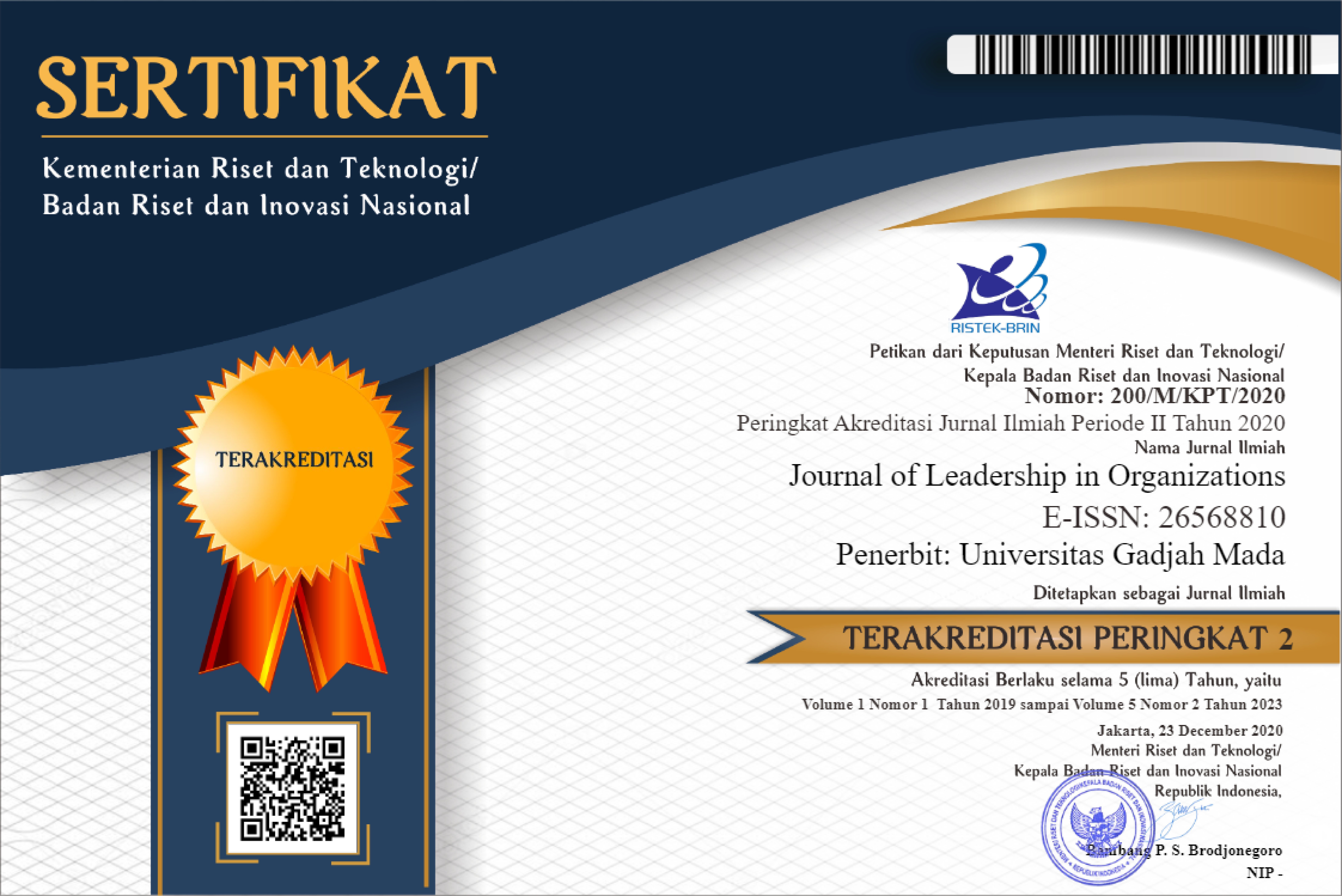THE EFFECT OF EMPOWERING LEADERSHIP ON INTRINSIC MOTIVATION: THE ROLE OF PSYCHOLOGICAL EMPOWERMENT AS A MEDIATION
Khaidir Syahrul(1*)
(1) Faculty of Economics, Universitas Negeri Makassar
(*) Corresponding Author
Abstract
This research aims to investigate the human resources managment within the government which requires a reliable and competent leadership. A leadership categorized as the concept of empowering when the leader shares direction, a support system, friendly, synergizing, and providing exemplary examples to his subordinates. Employees who feel empowered by the leader would increase their motivation in work. This would increase psychological side of the employee’s cognitions such as a meaningfulness, the competence, a self-determination, and the effect. This research is focused on the process of testing hypotheses and is aimed to examine the effect of empowering leadership’s motivation in the field of work. It is mediated by psychological empowerment. The data used in this study was a questionnaire. This study was used four-stage hypothesis test of Baron and Kenny (1986). The result indicates that empowering leadership has a positive effect on intrinsic motivation , and psychological empowerment partially mediates the positive effect of empowering leadership in supporting intrinsic motivation.
Full Text:
PDFReferences
Amundsen, S., & Martinsen, Ø. L. (2014). Empowering leadership : Construct clari fi cation , conceptualization , and validation of a new scale. The Leadership Quarterly. https://doi.org/10.1016/j.leaqua.2013.11.009.
Anonim, Undang-Undang Republik Indonesia Nomor 43 Tahun 1999 Tentang Perubahan Atas Undang-undang Nomor 8 Tahun 1974 tentang Pokok-pokok Kepegawaian.
Baron, R. M., dan Kenny, D. A. (1986). The Moderator-Mediator Variable Distinction in Social Psychological Research: Conceptual, Strategic, and Statistical Considerations. Journal of Personality and Social Psychology , Vol 51: 1173–1182.
Bass, B. M., dan Stogdill. (1990). Bass and Stogdil’s Handbook of Leadership (3rd ed.). New York: Free press.
BKPSDM. (2018) “Profil BKPSDM Kabupaten Jeneponto,” Badan Kepegawaian dan Pengembangan Sumber Daya Manusia Kabupaten Jeneponto Sulawesi Selatan.
Cooper, D. R., dan Schindler, P. S. (2014). Business Research Methods, 12th Edition. New York, NY: McGraw-Hill/Irwin. Eisenberger, R., Huntington, R., Hutchison, S., dan Sowa, D. (1986). Perceived Organizational Support. Journal of Applied Psychology, Vol 71(3): 500-507.
Dysvik, A., dan Kuvaas, B. (2010). Exploring the Relative and Combined Influence of Mastery-Approach Goals and Work Intrinsic Motivation on Employee Turnover Intention. Personnel Review , Vol 39, No 5, 622-638.
Meng, Y., Zou, L., He, J., dan Luo, C. (2015). Supervisors Leadership and Health Science Researchers Intrinsic Motivation The Mediate Role of Psychological Empowerment. Nankat Business Review International, Vol 6 No 1, 68-81.
Ryan, R.M. dan Deci, E.L. (2002), “An overview of self-determination theory: an organismic- dialectical perspective”, in Deci, E.L. and Ryan, R.M. (Eds), Handbook of Self-determination Research, The University of Rochester Press, Rochester, NY.
Spreitzer, G. M. (1995). Psychological Empowerment in the Workplace: Dimensions, Measurement and Validation. Academy of Management Journal , Vol 38 No 5, 1442-1465.
Saripudin, W. And Rosari, R. (2019). Does spiritual leadership model enhance work engagement? Empirical evidence from an islamic hospital in yogyakarta. Journal of Leadership in Organizations. 1(2), 112-133.
Thomas, K. W dan Velthouse, B. A. (1990). Cognitive Elements of Empowerment: An "Interpretive" Model of Intrinsic Task Motivation. The Academy of Management Review , 666.
Tung, H. dan Chang, Y. (2011). Effects of Empowering Leadership on Performance in Management Team Mediating Effects of Knowledge Sharing and Team Cohesion. Journal of Chinese Human Resources Management , Vol 2 No1, 43-60.
Zhang, Xiaomeng dan Bartol, K. M (2010). Linking Empowering Leadership and Employee Creativity: The Influence of Psychological Empowerment, Intrinsic Motivation, and Creative Process Engagement. The Academy of Management Journal , Vol 53 No1, 107-128.
Zhou, J., dan Shalley, C. E. 2003. Resesarch on Employee Creativity: A Critical Review and Direction for Future Research. In J. Martocchio (Ed.), Research in Personnel and Human Resource Management, 22: 165-217. Oxford, England: Elsevier.
Article Metrics
Refbacks
- There are currently no refbacks.
Copyright (c) 2020 Journal of Leadership in Organizations

This work is licensed under a Creative Commons Attribution-ShareAlike 4.0 International License.
| Journal of Leadership in Organizations |
| Journal of Leadership in Organizations (JLO), with registered number ISSN 2656-8829 (Print) and ISSN 2656-8810 (Online), is published by the Center for Leadership Studies, Department of Management, Faculty of Economics and Business, Universitas Gadjah Mada. The content of this website is licensed under a Creative Commons Attribution-ShareAlike 4.0 International License |
| © 2019 Journal of Leadership in Organizations | |





_logo2.png)


.png)




